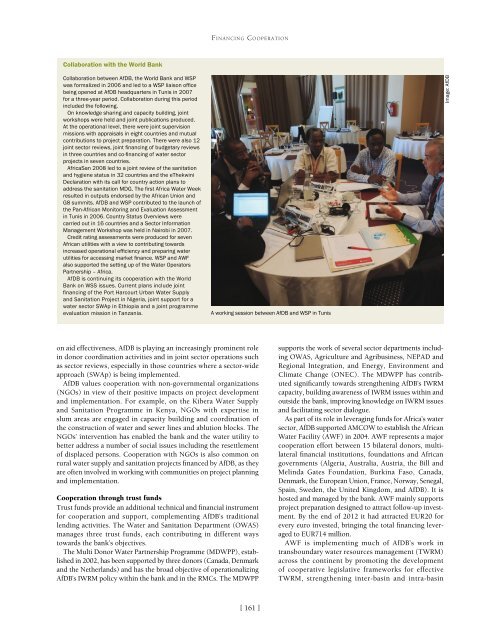Free Flow
oJhBl
oJhBl
You also want an ePaper? Increase the reach of your titles
YUMPU automatically turns print PDFs into web optimized ePapers that Google loves.
Financing Cooperation<br />
Collaboration with the World Bank<br />
Collaboration between AfDB, the World Bank and WSP<br />
was formalized in 2006 and led to a WSP liaison office<br />
being opened at AfDB headquarters in Tunis in 2007<br />
for a three-year period. Collaboration during this period<br />
included the following.<br />
On knowledge sharing and capacity building, joint<br />
workshops were held and joint publications produced.<br />
At the operational level, there were joint supervision<br />
missions with appraisals in eight countries and mutual<br />
contributions to project preparation. There were also 12<br />
joint sector reviews, joint financing of budgetary reviews<br />
in three countries and co-financing of water sector<br />
projects in seven countries.<br />
AfricaSan 2008 led to a joint review of the sanitation<br />
and hygiene status in 32 countries and the eThekwini<br />
Declaration with its call for country action plans to<br />
address the sanitation MDG. The first Africa Water Week<br />
resulted in outputs endorsed by the African Union and<br />
G8 summits. AfDB and WSP contributed to the launch of<br />
the Pan-African Monitoring and Evaluation Assessment<br />
in Tunis in 2006. Country Status Overviews were<br />
carried out in 16 countries and a Sector Information<br />
Management Workshop was held in Nairobi in 2007.<br />
Credit rating assessments were produced for seven<br />
African utilities with a view to contributing towards<br />
increased operational efficiency and preparing water<br />
utilities for accessing market finance. WSP and AWF<br />
also supported the setting up of the Water Operators<br />
Partnership – Africa.<br />
AfDB is continuing its cooperation with the World<br />
Bank on WSS issues. Current plans include joint<br />
financing of the Port Harcourt Urban Water Supply<br />
and Sanitation Project in Nigeria, joint support for a<br />
water sector SWAp in Ethiopia and a joint programme<br />
evaluation mission in Tanzania.<br />
A working session between AfDB and WSP in Tunis<br />
Image: AfDB<br />
on aid effectiveness, AfDB is playing an increasingly prominent role<br />
in donor coordination activities and in joint sector operations such<br />
as sector reviews, especially in those countries where a sector-wide<br />
approach (SWAp) is being implemented.<br />
AfDB values cooperation with non-governmental organizations<br />
(NGOs) in view of their positive impacts on project development<br />
and implementation. For example, on the Kibera Water Supply<br />
and Sanitation Programme in Kenya, NGOs with expertise in<br />
slum areas are engaged in capacity building and coordination of<br />
the construction of water and sewer lines and ablution blocks. The<br />
NGOs’ intervention has enabled the bank and the water utility to<br />
better address a number of social issues including the resettlement<br />
of displaced persons. Cooperation with NGOs is also common on<br />
rural water supply and sanitation projects financed by AfDB, as they<br />
are often involved in working with communities on project planning<br />
and implementation.<br />
Cooperation through trust funds<br />
Trust funds provide an additional technical and financial instrument<br />
for cooperation and support, complementing AfDB’s traditional<br />
lending activities. The Water and Sanitation Department (OWAS)<br />
manages three trust funds, each contributing in different ways<br />
towards the bank’s objectives.<br />
The Multi Donor Water Partnership Programme (MDWPP), established<br />
in 2002, has been supported by three donors (Canada, Denmark<br />
and the Netherlands) and has the broad objective of operationalizing<br />
AfDB’s IWRM policy within the bank and in the RMCs. The MDWPP<br />
supports the work of several sector departments including<br />
OWAS, Agriculture and Agribusiness, NEPAD and<br />
Regional Integration, and Energy, Environment and<br />
Climate Change (ONEC). The MDWPP has contributed<br />
significantly towards strengthening AfDB’s IWRM<br />
capacity, building awareness of IWRM issues within and<br />
outside the bank, improving knowledge on IWRM issues<br />
and facilitating sector dialogue.<br />
As part of its role in leveraging funds for Africa’s water<br />
sector, AfDB supported AMCOW to establish the African<br />
Water Facility (AWF) in 2004. AWF represents a major<br />
cooperation effort between 15 bilateral donors, multilateral<br />
financial institutions, foundations and African<br />
governments (Algeria, Australia, Austria, the Bill and<br />
Melinda Gates Foundation, Burkina Faso, Canada,<br />
Denmark, the European Union, France, Norway, Senegal,<br />
Spain, Sweden, the United Kingdom, and AfDB). It is<br />
hosted and managed by the bank. AWF mainly supports<br />
project preparation designed to attract follow-up investment.<br />
By the end of 2012 it had attracted EUR20 for<br />
every euro invested, bringing the total financing leveraged<br />
to EUR714 million.<br />
AWF is implementing much of AfDB’s work in<br />
transboundary water resources management (TWRM)<br />
across the continent by promoting the development<br />
of cooperative legislative frameworks for effective<br />
TWRM, strengthening inter-basin and intra-basin<br />
[ 161 ]


